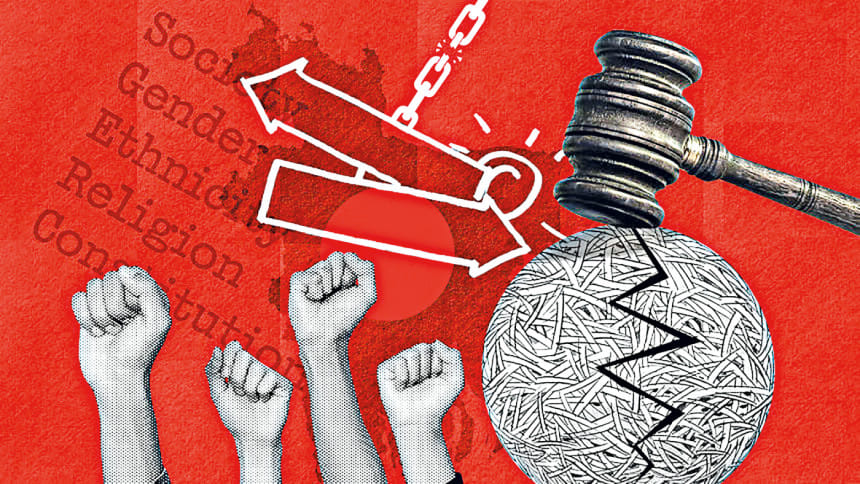Rethinking constitutional minimalism

In the midst of the political transition facing Bangladesh, some people have suggested that the country should adopt a simpler constitution, akin to that of the United States— one that enshrines only the loftiest aspirations of the people while relegating procedural intricacies to statutory enactments. This proposition, though lauded by some, prompts a pivotal question about the adaptability of such a minimalist constitution in Bangladesh's exigent political reality. While the allure of brevity might appear useful, this article argues that the transplantation of such a model is fraught with peril, ill-suited to Bangladesh's fractured socio-political context.
The celebrated American model is often praised for its elegance and adaptability, offering a stark contrast to the lengthier constitutions that prevail otherwise in different parts of the world. However, its brevity belies the complexities it masks, relying heavily on constitutional interpretation and a well-entrenched judicial system for its continued relevance. As scholars like Mila Versteeg and Emily Zackin have demonstrated that its longevity and stability are attributed to this conciseness, which creates room for flexibility through broad, adaptable principles rather than detailed provisions. The American constitutional framework relies on robust judicial interpretation and a well-established system of checks and balances, with the Supreme Court serving as the ultimate arbiter of constitutional meaning.
While the simplicity of the American short constitution may appeal to the admirers of minimalist constitutions, the socio-political and historical realities of Bangladesh demand a more detailed constitutional framework. The complexity of governance, the diversity of the nation, and the need for clarity and enforceable safeguards make the adoption of a short constitution impractical and potentially perilous.
This minimalistic approach thrives in a system marked by long-standing democratic traditions, stable institutions, and entrenched legal precedents. The historical context of its creation, emerging from revolution but within a homogeneous colonial framework, enabled the framers to rely on shared governance principles without extensive codification. Additionally, as noted by Tom Ginsburg and Mila Versteeg, the federal structure and state constitutions contributed significantly to the development and interpretation of the US Constitution.
Conversely, Bangladesh follows a markedly different historical trajectory. Born in 1971 from a bloody Liberation War, the country has contended with military coups, political turbulence, and a culture of patronage politics. The 1972 Constitution was designed to address the immediate imperatives of a developing, postcolonial state. It enshrines separation of powers, ideals of economic justice, and a range of emergency provisions, all necessary for a country grappling with the legacies of colonialism and the transcendence into post-independence governance. Unlike the American Constitution, whose brief nature is mitigated by judicial activism, Bangladesh's historical context demands a detailed constitutional framework that limits the scope for interpretive ambiguity. The specter of autocracy that has haunted Bangladesh necessitates clear safeguards— particularly in the arena of fundamental rights and executive overreach— lest a short constitution become an instrument of authoritarianism.
The assumption that a short constitution is effective hinges on a governance model of institutional maturity and predictability, conditions Bangladesh has yet to fully achieve. Bangladesh's institutional framework is plagued by periodic ruptures, polarisation, and a strained civil-military balance. The adoption of a short constitution could potentially worsen the situation, inviting interpretive manipulations by political elites and weakening the architecture of governance. The American experience, wherein interpretive flexibility has allowed constitutional principles to evolve, relies on a judiciary both empowered and independent. By contrast, the judiciary in Bangladesh, while at times leans on living constitutionalism, is frequently undermined by political interference, resource constraints, and systemic delays.
Judicial overreach, particularly in the context of Bangladesh's history of military rule, serves as a cautionary tale. Professors Ridwanul Hoque and Po Jen Yap have highlighted the intensive "judicialisation of politics" and the existence of "defensive judicial review" in Bangladesh and posited that when governments are no longer in power, in most of the cases only then the apex court of Bangladesh intervenes and delivers landmark judgments on those constitutional matters. Considering this, it becomes apparent that such judicial activism risks bringing forth overreach in politically charged environments, and a short constitution would exacerbate such risks by leaving too much open to judicial discretion.
Legal realism, with its insistence that law cannot be divorced from the political and social realities it governs, casts doubt on the efficacy of importing constitutional models wholesale. Pierre Legrand, Otto Kahn-FreundMartin Dixon, and David Landau, among others, caution against such transplantations, warning that failure to account for contextual specificities often leads to systemic dysfunction. Bangladesh, with its deeply polarised polity and history of military interventions, cannot afford the luxuries of abstraction that the American Constitution entails.
While the simplicity of the American short constitution may appeal to the admirers of minimalist constitutions, the socio-political and historical realities of Bangladesh demand a more detailed constitutional framework. The complexity of governance, the diversity of the nation, and the need for clarity and enforceable safeguards make the adoption of a short constitution both impractical and potentially perilous.
The writer is PhD candidate, Faculty of Law, University of Dhaka.

 For all latest news, follow The Daily Star's Google News channel.
For all latest news, follow The Daily Star's Google News channel. 



Comments